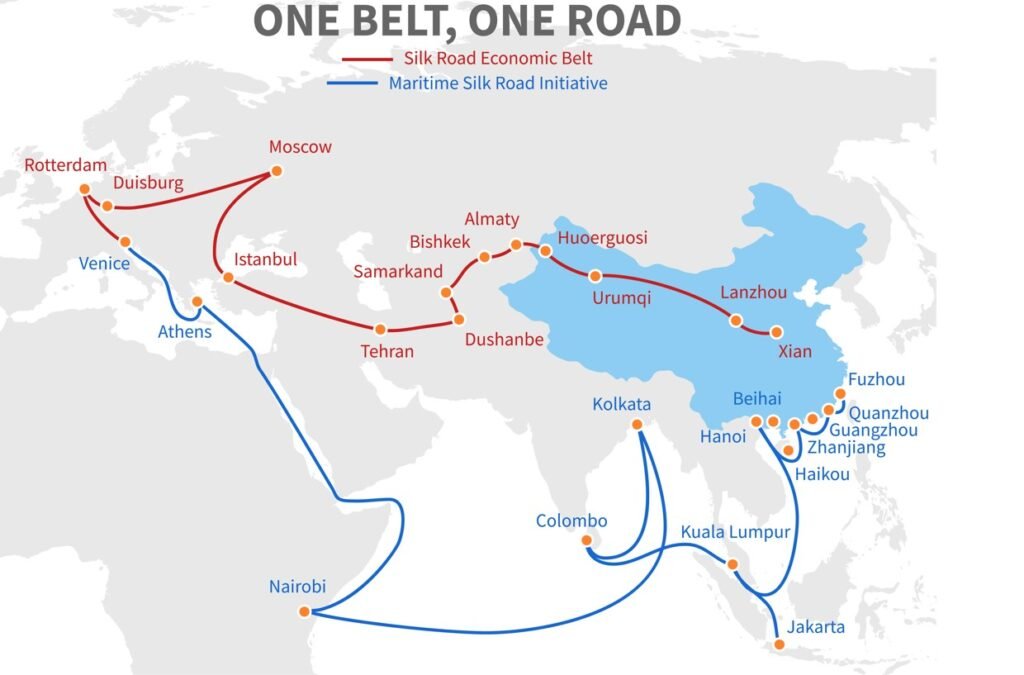When I'm asked which country is going to have the biggest impact this century, most people expect me to say something like: China, Russia, the USA or some other major power... but in reality, almost everyone forgets one country, which is going to have a huge impact by being one of the real pivots shifting the global balance: Turkey.
A bit like in the USA during every election, there are ‘swing states’, you know, those states that are always on the thin line between the two camps and can swing the election results from one camp to the other.
In Turkey, it's the same principle, but on a global scale.
This country can literally change the world's geopolitical balance, by switching from one side to the other.
And this is one of those moments.
Turkey, a bridge between Europe and Asia
While for several decades Turkey was constantly turned towards the West, wishing to join NATO and then the EU, in recent years things have changed and Turkey has gradually realized the decline of the West, but has also understood very well now that the economic future lies in Asia.
As a result, Turkey's elites have gradually shown a growing interest in joining the BRICS.
This interest was perceived thanks to Ankara's geopolitical maneuvers and economic strategies, which led to its official declaration in 2024 of its desire to join the BRICS, an announcement received like a thunderclap in the West.
By its very nature, Turkey straddles Europe and Asia, making it the crossroads of the world. The country tries to talk to everyone and try to never antagonize any power, a balancing act that often earns it accusations of opportunism.
Turkey's foreign policy is marked by fluctuating alliances and diplomatic recalibration.
Recently, however, President Erdogan's administration has often found itself at odds with its traditional Western allies, particularly the United States.
Turkey increasingly turns away from the West
Turkish-American relations are currently marked by tensions. President Erdogan's dissatisfaction with US policies was evident during his recent visit to Washington, where he expressed his dissatisfaction.
The friction stems from a number of issues, including the failure of the United States to end Israeli operations in Gaza and delays in the completion of a $23 billion contract for F-16 fighter jets, pushing back delivery dates to 2028.
These delays have been attributed to Lockheed Martin's existing commitments, which the Erdogan administration regards as a strategic affront.
Beyond this ‘frustration’, there is also a huge loss of interest in Turkey for the Western elites, who are increasingly perceived as having little value and never keeping their promises.
These tensions have led Turkey to explore other alliances and seek more balanced and trustworthy international relations.
A natural attraction towards the BRICS
So it's only natural that Turkey should turn its attention to the BRICS, which carry increasing economic and political weight on the world stage.
Turkey's interest in joining the BRICS is not simply a question of changing alliances, but is deeply rooted in its nature as a ‘crossroads’, naturally aspiring to a multipolar world order that would allow it to develop fully and help it to overcome the deep frustration it has developed with the West.
Turkey therefore fits in perfectly with the BRICS, which are seeking to diversify their international partnerships on a multilateral basis.

But Turkey's ambitions extend far beyond the BRICS.
Erdogan also expressed his wish to become a full member of the Shanghai Cooperation Organisation (SCO).
This desire has been expressed not only in previous years, but more recently at a NATO summit, where Erdogan's statements were marked by a tone of urgency and determination.
Turkey, the final piece in the BRICS jigsaw
In economic terms, Turkey has everything to gain from closer ties with the BRICS countries.
The country's economy, while resilient, has faced challenges, including high inflation and a volatile currency. Joining the BRICS could give Turkey access to new markets, investment opportunities and technological cooperation.
In addition, the BRICS countries have shown their willingness to support each other through financial mechanisms such as the New Development Bank, which could be beneficial for Turkey's stability and economic growth.
In addition, Turkey's strategic position as a bridge between Europe and Asia makes it a valuable and ideal partner for the BRICS, particularly in the context of the Chinese initiative Belt and Road Initiative.

This initiative aims to strengthen regional connectivity and could see Turkey play a central role in facilitating trade routes and infrastructure projects.
Turkey's potential membership of the BRICS also has important political implications. It would symbolize a break with its traditionally Western-oriented foreign policy, reflecting a more independent and assertive position on the world stage.
This change is not entirely new; Turkey has already demonstrated its willingness to pursue a more autonomous foreign policy, as shown by its military operations in Syria and its purchase of the Russian S-400 missile defense system, which led to sanctions by the United States.
Turkey, the mirror of Western defeat
What many Western analysts also fail to understand is that Turkey's frustrations with NATO and the United States are not just about specific grievances, but also about a wider dissatisfaction with Western-led international structures.
Although Turkey has tried to make its voice heard by the West, it has, like many others, been met with a kind of contempt, and sometimes even mockery, with the Western media sometimes poking fun at Erdogan's discontent.

By wanting to join the BRICS, Turkey is expressing its desire for a new form of global governance in which all the major economies, both old and emerging, will have their say and will not be turned away, as they were with the West and especially the USA, which has left a bitter taste in Turkey's mouth, as it has in the mouths of many other countries.
During one of his speeches at the United Nations, Erdogan made this clear:
In Gaza, it is not just children who are dying, but also the United Nations system. The values that the West claims to defend are dying, the truth is dying, and humanity's hope of living in a fairer world is dying - one by one.
President Erdogan
Alignment of Turkey and the BRICS becoming evident
The alignment of Turkey's interests with those of the BRICS is now emerging as obvious.
The BRICS line is part of Turkey's wider objectives of economic diversification and geopolitical rebalancing. It is also a response to the challenges and frustrations it faces within the Western bloc.
Turkey's approaches to the BRICS and the SCO can be seen as part of a broader strategy to position itself as a key player in a multipolar world. This strategy includes taking advantage of its unique geographical position, economic potential and political influence to carve out a greater role for itself on the world stage.
In conclusion, Turkey's approach to the BRICS is calculated and motivated by both sincere aspirations and strategic necessity.
As the transition to a multipolar world continues to accelerate, Turkey's potential inclusion in the BRICS could have a huge impact on the geopolitical landscape, acting as a crucial pivot in the global geopolitical balance.
Turkey will therefore be one of the world's ‘swing states’, and will surely tip the balance in its definitive shift towards a multipolar world.
To find out more:
France 24 : Turkey's bid to join the Brics: a threat to NATO or a subtle balancing act?
Think BRICS : Turkish Approach Towards BRICS: Is It Genuine?
Terra Bellum : Why is Turkey turning away from Europe?







Merci beaucoup. Très intéressant. Elle devra encore attendre , si j’ai bien compris, elle est pour l’instant dans la salle d’attente.
Le statut a progressé ! Merci de votre commentaire